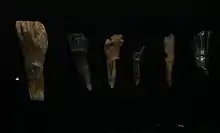| Ischyrhiza | |
|---|---|
 | |
| Ischyrhiza mira rostral spines | |
| Scientific classification | |
| Kingdom: | |
| Phylum: | |
| Class: | |
| Order: | |
| Suborder: | |
| Genus: | †Ischyrhiza Leidy, 1856 |
| Type species | |
| †Ischyrhiza mira Leidy, 1856 | |
| Species | |
Ischyrhiza Ischyrhiza Leidy, 1856 genus accepted Ischyrhiza mira Ischyrhiza mira (Leidy, 1856) species accepted Ischyrhiza iwakiensis Ischyrhiza iwakiensis Uyeno & Hasegawa, 1986 species accepted Ischyrhiza serra Ischyrhiza serra Nessov, 1997 species accepted Ischyrhiza nigeriensis Ischyrhiza nigeriensis Tabaste, 1963 species accepted Ischyrhiza hartenbergeri Ischyrhiza hartenbergeri Cappetta, 1975 species accepted Ischyrhiza germaniae Ischyrhiza germaniae Weiler & Albers, 1964 species accepted Ischyrhiza viaudi Ischyrhiza viaudi Cappetta, 1981 species accepted Ischyrhiza avonicola Ischyrhiza avonicola Estes, 1964 species accepted Ischyrhiza texana Ischyrhiza texana (Cappetta & Case, 1975) species accepted Ischyrhiza antiqua Ischyrhiza antiqua (Leidy, 1856) species accepted Ischyrhiza radiata Ischyrhiza radiata (Clark, 1895) | |
Ischyrhiza is an extinct genus of sclerorhynchoid ray from the Late Cretaceous and Early Paleogene.[3]
It had a large, toothed rostrum closely resembling that of a modern-day sawfish. Despite formerly being classified within a family of extinct sawfish-like rays known as Sclerorhynchidae,[4] phylogenetic analyses indicate that Ischyrhiza, Schizorhiza, and Onchopristis form a distinct clade that groups closer with the extant family Rajidae, which contains the true skates, possibly rendering the suborder Sclerorhynchoidei paraphyletic.[5]
Fossils of the genus have been found in Canada, the United States, the Aguja Formation of Mexico, the Bissekty Formation of Uzbekistan, the Tamayama Formation of Japan, the Dukamaje Formation of Niger, the El Molino Formation of Bolivia, the Quiriquina Formation of Chile, and the Chota Formation of Peru.[6][7]
References
- ↑ ESTES, R. (1964) Fossil vertebrates from the Late Cretaceous Lance Formation, Eastern Wyoming. University of California Publications in Geological Sciences, 49: 1–180, 73 fig., 5 pl.
- ↑ Leidy (1856) - Notice of remains of extinct vertebrated animals of New-Jersey, collected by Prof. Cook of the State Geological Survey under the direction of Dr. W. Kitchell. Proceedings of the Academy of Natural Sciences of Philadelphia, 8: 220–221
- ↑ Fossils (Smithsonian Handbooks) by David Ward (Page 205)
- ↑ "Fossilworks: Sclerorhynchidae". fossilworks.org. Retrieved 17 December 2021.
- ↑ Villalobos‐Segura, Eduardo; Underwood, Charlie J.; Ward, David J. (2019). "The first skeletal record of the enigmatic Cretaceous sawfish genus Ptychotrygon (Chondrichthyes, Batoidea) from the Turonian of Morocco". Papers in Palaeontology. 7: 353–376. doi:10.1002/spp2.1287. ISSN 2056-2802. S2CID 210302939.
- ↑ Ischyrhiza at Fossilworks.org
- ↑ The Paleobiology Database accessed on 8/21/09